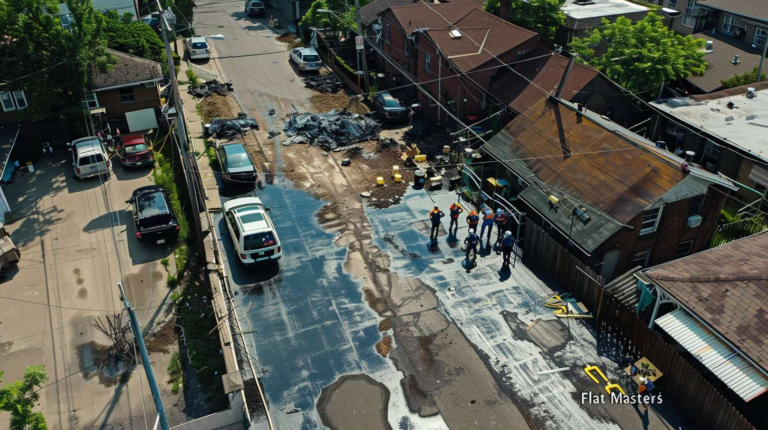Professional Flat Top Roof Construction Services Near You
Look, I've been building flat roofs in Queens for over two decades now, and let me tell you something - there's a right way and a wrong way to do flat top roof construction. The wrong way? You'll be calling me back in three years with water damage and headaches. The right way? I've got flat roofs in Astoria that are still bone dry after fifteen years.
Understanding Flat Top Roof Construction
When we talk about flat top roof construction, we're really talking about building a low-slope roofing system that can handle Queens weather year-round. These roofs aren't actually flat - that's a rookie mistake I see all the time. A properly constructed flat roof has a slight slope, typically 1/4 inch per foot, to ensure proper drainage. Without that slope, you're basically building a swimming pool on top of your building.
Here's what goes into a proper flat roof build: First, we need a solid structural deck - usually plywood or OSB sheathing over your joists. Then comes the vapor barrier, followed by insulation (we use polyiso boards here in Queens because they handle our humidity better), another cover board, and finally the membrane system.
How to Build a Flat Top Roof: The Professional Process
I get asked about how to build a flat top roof almost weekly, especially from contractors who are used to pitched roofing. The foundation starts with your structural framing - and in Queens, with our snow loads and the occasional hurricane, you can't mess around with undersized joists.
The decking needs to be perfect. Any gaps, any warping, any moisture in that wood before we start, and you're asking for trouble down the road. My crew always checks moisture content with our meter before we lay the first sheet of vapor barrier.
Then comes the insulation layer. We typically use 2-3 inches of polyisocyanurate board insulation, depending on the building's energy requirements. The cover board goes on next - usually DensDeck or similar gypsum-based product that gives us a smooth, stable surface for the membrane.
But here's where experience really matters: the membrane installation. Whether we're doing EPDM rubber, TPO, or modified bitumen, the devil is in the details. Seams, penetrations, edge details - that's where flat roofs fail. I've seen beautiful-looking installations that leak like sieves because someone rushed the detail work.
Material Choices for Queens Weather
Living here in Queens, you know our weather doesn't mess around. We get everything from August heat waves that make the roof surface hit 180 degrees, to February ice storms that test every seam and fastener.
For flat top roof construction in our climate, I typically recommend either EPDM or TPO systems. EPDM rubber has been my go-to for residential work - it handles temperature swings beautifully and when properly installed, lasts 20-25 years easy. TPO is gaining ground, especially for commercial applications, because of its energy efficiency and weldable seams.
Modified bitumen still has its place, particularly on buildings where we need something that can handle foot traffic or mechanical equipment. But installation is more labor-intensive, and finding qualified crews who can torch-apply it properly is getting harder.
The Critical Details That Make or Break a Flat Roof
After twenty-three years doing this work, from Forest Hills to Flushing, I can tell you that 90% of flat roof problems come down to three things: drainage, penetrations, and edge details.
Drainage first - if water sits on your roof for more than 48 hours after a storm, something's wrong with the design or installation. We install tapered insulation systems to create positive drainage to the drains and scuppers. And those drains? They need to be sized properly and positioned correctly during framing, not as an afterthought.
Penetrations are where most leaks start. Every vent pipe, HVAC curb, electrical conduit - they all need proper flashing details. I use manufactured penetration boots whenever possible, and always seal with compatible materials. Mixing different sealant chemistries is asking for adhesion failures.
Code Requirements and Permits
In Queens, any significant roofing work requires permits, and flat roof replacement definitely qualifies. The building department wants to see structural calculations, especially if you're adding insulation that increases dead load. Energy code compliance is getting stricter too - we're seeing R-30 minimum requirements for most commercial work.
Fire ratings matter on flat roofs, particularly in attached buildings. We need Class A fire-rated assemblies in most cases, which affects both membrane choice and insulation type.
Cost Factors for Flat Roof Construction
Flat top roof construction costs vary significantly based on the building size, access, existing conditions, and material choices. A basic EPDM system on a simple rectangular building might run $8-12 per square foot installed. TPO systems typically add 15-20% to that cost. Modified bitumen falls somewhere in the middle.
But here's what drives costs up: complicated shapes, multiple penetrations, difficult access, and especially tear-off of existing roofing. I just finished a job in Elmhurst where we had to hand-carry everything up four flights of stairs - labor costs doubled.
Insulation upgrades add cost but pay for themselves in energy savings. Going from minimal insulation to R-30 might add $2-3 per square foot, but the heating and cooling savings are significant.
Why Professional Installation Matters
I've repaired too many DIY disasters and cut-rate installations to count. Flat roofing isn't forgiving - there's no gravity working in your favor like with pitched roofs. Every detail needs to be perfect because water will find any weakness.
The tools alone represent a significant investment. Professional heat welders for TPO, specialized adhesives that need temperature-controlled storage, precision measuring equipment for proper slopes - it's not something you improvise with hardware store supplies.
Our crew at Flat Masters NY has the experience to handle the unexpected conditions we always find on older Queens buildings. Structural issues, existing water damage, non-standard framing - we solve problems, not create them.
Maintenance and Long-term Performance
A properly constructed flat roof needs regular maintenance to reach its design life. We recommend annual inspections, particularly after severe weather. Keeping drains clear, checking seams and flashings, addressing small issues before they become big problems.
The investment in quality flat top roof construction pays off in the long run. I've got customers in Jackson Heights still on their original roof membrane after eighteen years, while their neighbors who went with the low bidder are on their second replacement.
For professional flat roof construction in Queens, contact Flat Masters NY. We bring decades of local experience to every project, from small residential buildings to large commercial installations. Our work is backed by comprehensive warranties and the kind of attention to detail that comes from being in business here for over twenty years.


